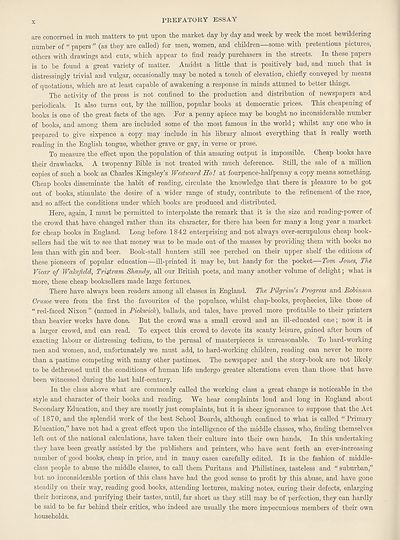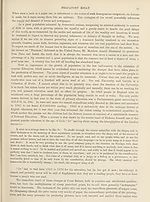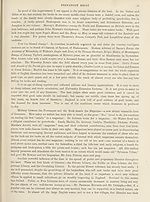New volumes of the Encyclopædia Britannica > Volume 30, K-MOR
(14) Page x
Download files
Complete book:
Individual page:
Thumbnail gallery: Grid view | List view

X
PREFATORY ESSAY
are concerned in such matters to put upon the market day by day and week by week the most bewildering
number of “ papers ” (as they are called) for men, women, and children—some with pretentious pictures,
others with drawings and cuts, which appear to find ready purchasers in the streets. In these papers
is to be found a great variety of matter. Amidst a little that is positively bad, and much that is
distressingly trivial and vulgar, occasionally may be noted a touch of elevation, chiefly conveyed by means
of quotations, which are at least capable of awakening a response in minds attuned to better things.
The activity of the press is not confined to the production and distribution of newspapers and
periodicals. It also turns out, by the million, popular books at democratic prices. This cheapening of
books is one of the great facts of the age. For a penny apiece may be bought no inconsiderable number
of books, and among them are included some of the most famous in the world; whilst any one who is
prepared to give sixpence a copy may include in his library almost everything that is really worth
reading in the English tongue, whether grave or gay, in verse or prose.
To measure the effect upon the population of this amazing output is impossible. Cheap books have
their drawbacks. A twopenny Bible is not treated with much deference. Still, the sale of a million
copies of such a book as Charles Kingsley’s Westward Ho! at fourpence-halfpenny a copy means something.
Cheap books disseminate the habit of reading, circulate the knowledge that there is pleasure to be got
out of books, stimulate the desire of a wider range of study, contribute to the refinement of the race,
and so affect the conditions under which books are produced and distributed.
Here, again, I must be permitted to interpolate the remark that it is the size and reading-power of
the crowd that have changed rather than its character, for there has been for many a long year a market
for cheap books in England. Long before 1842 enterprising and not always over-scrupulous cheap book¬
sellers had the wit to see that money was to be made out of the masses by providing them with books no
less than with gin and beer. Book-stall hunters still see perched on their upper shelf the editions of
these pioneers of popular education—ill-printed it may be, but handy for the pocket—Tom Jones, The
Vicar of Wakefield, Tristram Shandy, all our British poets, and many another volume of delight; what is
more, these cheap booksellers made large fortunes.
There have always been readers among all classes in England. The Pilgrim's Progress and Robinson
Crusoe were from the first the favourites of the populace, whilst chap-books, prophecies, like those of
“ red-faced Nixon ” (named in Pickwick), ballads, and tales, have proved more profitable to their printers
than heavier works have done. But the crowd was a small crowd and an ill-educated one; now it is
a larger crowd, and can read. To expect this crowd to devote its scanty leisure, gained after hours of
exacting labour or distressing tedium, to the perusal of masterpieces is unreasonable. To hard-working
men and women, and, unfortunately we must add, to hard-working children, reading can never be more
than a pastime competing with many other pastimes. The newspaper and the story-book are not likely
to be dethroned until the conditions of human life undergo greater alterations even than those that have
been witnessed during the last half-century.
In the class above what are commonly called the working class a great change is noticeable in the
style and character of their books and reading. We hear complaints loud and long in England about
Secondary Education, and they are mostly just complaints, but it is sheer ignorance to suppose that the Act
of 1870, and the splendid work of the best School Boards, although confined to what is called “Primary
Education,” have not had a great effect upon the intelligence of the middle classes, who, finding themselves
left out of the national calculations, have taken their culture into their own hands. In this undertaking
they have been greatly assisted by the publishers and printers, who have sent forth an ever-increasing
number of good books, cheap in price, and in many cases carefully edited. It is the fashion of middle-
class people to abuse the middle classes, to call them Puritans and Philistines, tasteless and “ suburban,”
but no inconsiderable portion of this class have had the good sense to profit by this abuse, and have gone
steadily on their way, reading good books, attending lectures, making notes, curing their defects, enlarging
their horizons, and purifying their tastes, until, far short as they still may be of perfection, they can hardly
be said to be far behind their critics, who indeed are usually the more impecunious members of their own
households.
PREFATORY ESSAY
are concerned in such matters to put upon the market day by day and week by week the most bewildering
number of “ papers ” (as they are called) for men, women, and children—some with pretentious pictures,
others with drawings and cuts, which appear to find ready purchasers in the streets. In these papers
is to be found a great variety of matter. Amidst a little that is positively bad, and much that is
distressingly trivial and vulgar, occasionally may be noted a touch of elevation, chiefly conveyed by means
of quotations, which are at least capable of awakening a response in minds attuned to better things.
The activity of the press is not confined to the production and distribution of newspapers and
periodicals. It also turns out, by the million, popular books at democratic prices. This cheapening of
books is one of the great facts of the age. For a penny apiece may be bought no inconsiderable number
of books, and among them are included some of the most famous in the world; whilst any one who is
prepared to give sixpence a copy may include in his library almost everything that is really worth
reading in the English tongue, whether grave or gay, in verse or prose.
To measure the effect upon the population of this amazing output is impossible. Cheap books have
their drawbacks. A twopenny Bible is not treated with much deference. Still, the sale of a million
copies of such a book as Charles Kingsley’s Westward Ho! at fourpence-halfpenny a copy means something.
Cheap books disseminate the habit of reading, circulate the knowledge that there is pleasure to be got
out of books, stimulate the desire of a wider range of study, contribute to the refinement of the race,
and so affect the conditions under which books are produced and distributed.
Here, again, I must be permitted to interpolate the remark that it is the size and reading-power of
the crowd that have changed rather than its character, for there has been for many a long year a market
for cheap books in England. Long before 1842 enterprising and not always over-scrupulous cheap book¬
sellers had the wit to see that money was to be made out of the masses by providing them with books no
less than with gin and beer. Book-stall hunters still see perched on their upper shelf the editions of
these pioneers of popular education—ill-printed it may be, but handy for the pocket—Tom Jones, The
Vicar of Wakefield, Tristram Shandy, all our British poets, and many another volume of delight; what is
more, these cheap booksellers made large fortunes.
There have always been readers among all classes in England. The Pilgrim's Progress and Robinson
Crusoe were from the first the favourites of the populace, whilst chap-books, prophecies, like those of
“ red-faced Nixon ” (named in Pickwick), ballads, and tales, have proved more profitable to their printers
than heavier works have done. But the crowd was a small crowd and an ill-educated one; now it is
a larger crowd, and can read. To expect this crowd to devote its scanty leisure, gained after hours of
exacting labour or distressing tedium, to the perusal of masterpieces is unreasonable. To hard-working
men and women, and, unfortunately we must add, to hard-working children, reading can never be more
than a pastime competing with many other pastimes. The newspaper and the story-book are not likely
to be dethroned until the conditions of human life undergo greater alterations even than those that have
been witnessed during the last half-century.
In the class above what are commonly called the working class a great change is noticeable in the
style and character of their books and reading. We hear complaints loud and long in England about
Secondary Education, and they are mostly just complaints, but it is sheer ignorance to suppose that the Act
of 1870, and the splendid work of the best School Boards, although confined to what is called “Primary
Education,” have not had a great effect upon the intelligence of the middle classes, who, finding themselves
left out of the national calculations, have taken their culture into their own hands. In this undertaking
they have been greatly assisted by the publishers and printers, who have sent forth an ever-increasing
number of good books, cheap in price, and in many cases carefully edited. It is the fashion of middle-
class people to abuse the middle classes, to call them Puritans and Philistines, tasteless and “ suburban,”
but no inconsiderable portion of this class have had the good sense to profit by this abuse, and have gone
steadily on their way, reading good books, attending lectures, making notes, curing their defects, enlarging
their horizons, and purifying their tastes, until, far short as they still may be of perfection, they can hardly
be said to be far behind their critics, who indeed are usually the more impecunious members of their own
households.
Set display mode to:
![]() Universal Viewer |
Universal Viewer | ![]() Mirador |
Large image | Transcription
Mirador |
Large image | Transcription
Images and transcriptions on this page, including medium image downloads, may be used under the Creative Commons Attribution 4.0 International Licence unless otherwise stated. ![]()
| Encyclopaedia Britannica > New volumes of the Encyclopædia Britannica > Volume 30, K-MOR > (14) Page x |
|---|
| Permanent URL | https://digital.nls.uk/193567683 |
|---|
| Attribution and copyright: |
|
|---|---|
| Shelfmark | EB.18 |
|---|---|
| Description | Ten editions of 'Encyclopaedia Britannica', issued from 1768-1903, in 231 volumes. Originally issued in 100 weekly parts (3 volumes) between 1768 and 1771 by publishers: Colin Macfarquhar and Andrew Bell (Edinburgh); editor: William Smellie: engraver: Andrew Bell. Expanded editions in the 19th century featured more volumes and contributions from leading experts in their fields. Managed and published in Edinburgh up to the 9th edition (25 volumes, from 1875-1889); the 10th edition (1902-1903) re-issued the 9th edition, with 11 supplementary volumes. |
|---|---|
| Additional NLS resources: |
|

